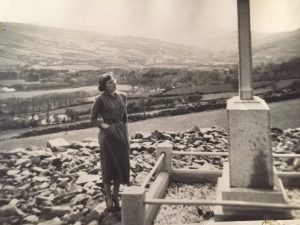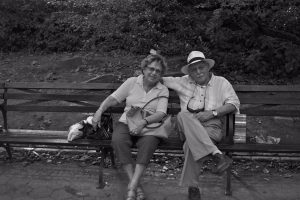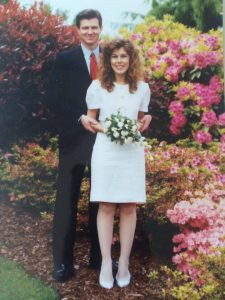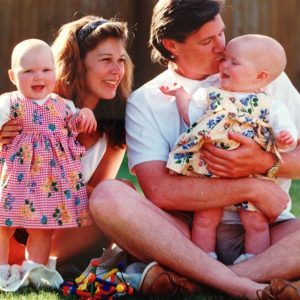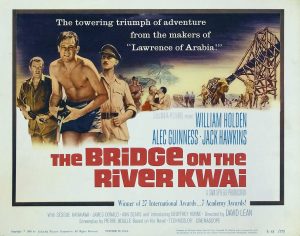
The Bridge on the River Kwai (1957)
As a Canadian, I know the American military as fictional character. The military is the journey down the Nung River to assassinate Colonel Kurtz; it’s the destruction of a bridge built by British POW’s on the River Kwai; it’s the Kathryn Bigelow film that won Best Picture in 2010 that I never saw but I’m sure was great; it’s Jessica Chastain leading a team to assassinate Osama bin Laden with a plot that was way too confusing for my 12 year-old self; it’s Vincent D’Onofrio doing the Kubrick stare in a communal bathroom while reciting the Riflemen’s Creed.
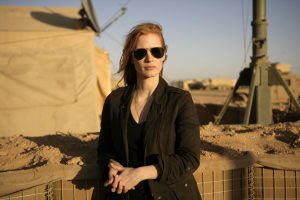
Zero Dark Thirty (2012)
I have no personal connection to the military, much less the infamous American forces. In Canada, we remember the First World War that happened a century ago for about a week each year. But in America, it’s everywhere, everyday.
I’m fascinated by the universal admiration and unconditional respect granted towards veterans. When I was in Texas recently, I saw dozens of cars, mostly trucks, with stickers indicating that the driver was a veteran, it was something they wanted the world to know. Everywhere we went advertised discounts for veterans. One of the universities we visited, Texas A&M at College Station, is one of six United States Senior Military Colleges. We saw men my age (you could practically call them boys) walking around in the blazing heat in full uniform, equipped with knee high leather boots. When my family went to New York for the first time when I was 12, we took a train from JFK to Manhattan upon arrival. The first person we spoke to was a young man who was on his way to school at West Point. My dad was impressed, I was oblivious.
Military status is so valued in America that there are people who walk around impersonating military office
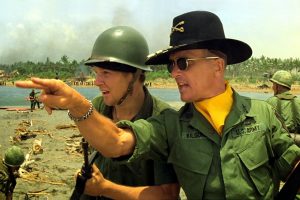
Apocalypse Now (1979)
rs, and in response, those who look out for this impersonation and call them out. They look for flaws in their uniforms, they ask them detailed questions to catch them in a lie. They film their encounter, and once they’re sure of the accused’s guilt, they yell “Stolen Valor!”, and publicly shame them. Anthony Anderson runs a Stolen Valor website called guardianofvalor.com with its very own ‘Hall of Shame’, a database with pictures, names, and write-ups of men and women who have impersonated military officers. This issue has even been taken to the federal level. In 2005, George W. Bush singed a law declaring it a federal misdemeanour to falsely represent oneself as having any US military decoration. In 2013, that law was adapted to protect freedom of speech, now making it illegal to benefit financially from an impersonation, such as receiving discounts or obtaining money or property.
Anderson has noted in an interview with the podcast ‘Reply All’ that publicly shaming a military impersonator has viral potential.
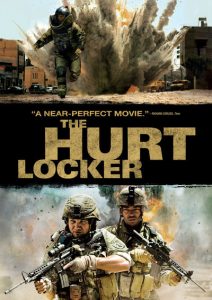
The Hurt Locker (2009)
“I use this word and – an- and I tell people I hate using it, is–there’s entertainment value behind the video. … it actually caused … representatives, lawmakers to get involved with the Stolen Valor movement. And that one video has, so far, caused five new Stolen Valor laws to be passed in five different states.”
Both Anderson and Nate Bathea, who was stationed in Afghanistan in 2009, have noted the dangers of people going too far in their search for authenticity. Unfortunately, the movement has cause some to go after those who are military, but simply don’t want to be confronted, therefore making themselves look guilty. People with mental disabilities who wear
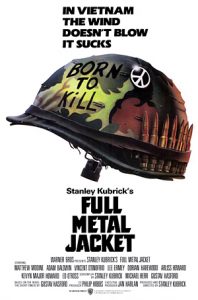
Full Metal Jacket (1987)
uniforms as a form of admiration have been harassed and humiliated. Anderson firmly claims that this is not the true intention of the Stolen Valor movement, and he takes action for copycat websites that post these videos to be removed.
Bethea says he wishes the Stolen Valor movement didn’t have to exist. To him, the reason for it is the major disconnect between civilians and servicemen.
“The people who wear uniforms are still people. Because it’s weird when people are treating you like a symbol and you’re trying to say, ‘Hey man, talk to me, I’m a person.’ Like, talk to me as a human being not – not as th- the symbolic representation of what you think the uniform I’m wearing means.”
I’ll never be able to fully understand what it means to work in the military. And I don’t think anyone truly knows until they experience it themselves. The fact of the matter is that I never want to.
Vogt, P.J. (Host). Pinnamaneni, S. (Producer). (2016, July 14). Stolen Valor. Reply All. Podcast retrieved from https://gimletmedia.com/episode/70-stolen-valor/
